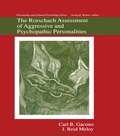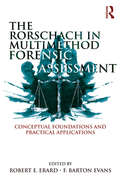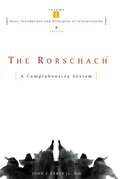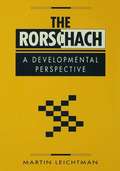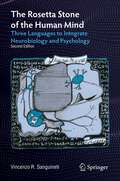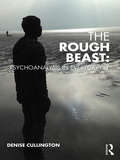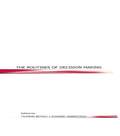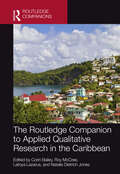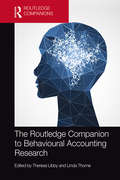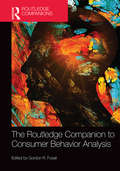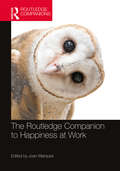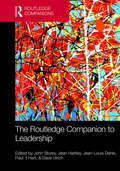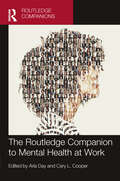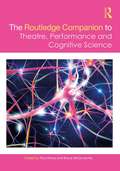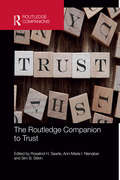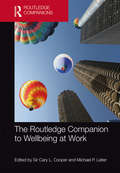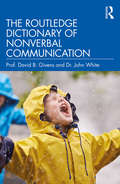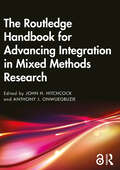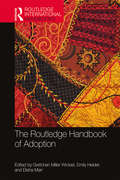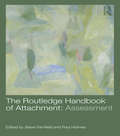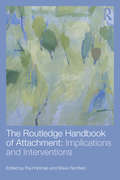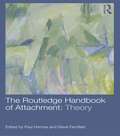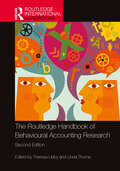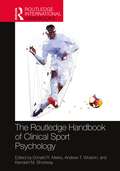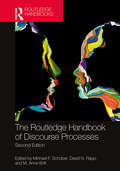- Table View
- List View
The Rorschach Assessment of Aggressive and Psychopathic Personalities (Personality and Clinical Psychology)
by Carl B. Gacono J. Reid MeloyThis book provides a definitive empirical study of antisocial character pathology and its assessment through the use of the Rorschach. Drawing upon a decade of research with nearly 400 individuals in various hospitals and prisons, the authors paint an extraordinary intrapsychic picture of the personality structure and psychodynamics of these troublesome patients.Serving as both an educational tool and a reference text, this book presents: * Rorschach data on several different antisocial groups -- conduct disordered children and adolescents, antisocial personality disordered adult males with and without schizophrenia, antisocial adult females, and male and female sexual homicide perpetrators; * nomothetic (group) and idiographic (case study) data; * data which have been analyzed and theoretically interpreted using both structural methods and psychoanalytic approaches which represent the cutting edge of Rorschach theory and practice; and* a developmental approach in analyzing Rorschach data gathered from antisocial children, adolescents, and adults -- providing striking similarities. This is the first Rorschach database of this type that has ever been published. As such, it serves as a valuable reference text for Rorschach users -- providing a definitive empirical base, theoretical integration, and a focus on individuals who create severe problems for society.
The Rorschach in Multimethod Forensic Assessment: Conceptual Foundations and Practical Applications
by Robert E. Erard F. Barton EvansThis volume demonstrates how multimethod forensic assessment with the Rorschach adds incremental validity, insight, and practical value. Case discussions by leading forensic psychologists illustrate the integration of contemporary Rorschach assessment with the MMPI-2 and MMPI-2-RF, the PAI, and the HCR-20. This text addresses a wide range of forensic applications including child custody, psychological trauma, personal injury, psychotic offenders, competency evaluations, immigration cases, and impression management. It also shows how the recently developed Rorschach Performance Assessment System (R-PAS) effectively enhances the use of the Rorschach in forensic cases, while offering guidance for Comprehensive System users as well.
The Rorschach: A Comprehensive System (Fourth Edition) (Basic Foundations And Principles Of Interpretation #Volume 1)
by John E. ExnerThis new edition provides updated research and information on administering, scoring, and interpreting the Rorschach test, as well as new normative data, coverage of recent controversies and criticisms of the test, and illustrative case studies.
The Rorschach: A Developmental Perspective
by Martin LeichtmanMartin Leichtman's The Rorschach is a work of stunning originality that takes as its point of departure a circumstance that has long confounded Rorschach examiners. Attempts to use the Rorschach with young children yield results that are inconsistent if not comical. What, after all, does one make of a protocol when the child treats a card like a frisbee or confidently detects "piadigats" and "red foombas"? A far more consequential problem facing examiners of adults and children alike concerns the very nature of the Rorschach test. Despite voluminous literature establishing the personality correlates of particular Rorschach scores, neither Hermann Rorschach nor his intellectual descendants have provided an adequate explanation of precisely what the subject is being asked to do. Is the Rorschach a test of imagination? Of perception? Of projection? In point of fact, Leichtman argues, the two problems are intimately related. To appreciate the stages through which children gradually master the Rorschach in its standard form is to discover the nature of the test itself. Integrating his developmental analysis with an illuminating discussion of the extensive literature on test administration, scoring, and interpretation, Leichtman arrives at a new understanding of the Rorschach as a test of representation and creativity. This finding, in turn, leads to an intriguing reconceptualization of all projective tests that clarifies their relationships to more objective measures of ability.
The Rosetta Stone of the Human Mind: Three Languages to Integrate Neurobiology and Psychology
by Vincenzo R. SanguinetiThe study of the brain-mind complex has been hampered by the dichotomy between objective biological neuroscience and subjective psychological science. This book presents a new theoretical model for how to "translate" between the two, using a third language: nonlinear physics and mathematics. It illustrates how the simultaneous use of these two approaches enriches the understanding of the neural and mental realms.
The Rough Beast: Psychoanalysis In Everyday Life
by Denise CullingtonThe past continues to operate powerfully, wordlessly, in that less conscious part of our human mind and can trip us up unexpectedly. We can perceive and respond to situations in ways which are more to do with early experiences than the present. We can push from mind what we would rather not know. Feelings such as doubt and sadness can seem too weak; envy and anger, too bad; feeling small and in any way in need, could leave us too vulnerable. Though most will never have their own experience of psychoanalysis (or less intensive psychoanalytic psychotherapy), psychoanalytic ideas can be profoundly helpful in making sense of ourselves. Having some access to those more hidden parts of our human mind, we can feel more alive, more real and less likely to act out in unexpected ways. An accessible, sympathetic and challenging guide, The Rough Beast: Psychoanalysis in Everyday Life is for all those who are curious and sceptical as to what, why and how psychoanalytic understanding is useful in everyday life.
The Routines of Decision Making
by Tilmann Betsch Susanne HaberstrohExperience is currently a hot theme in decision making. For a long time, decision research was almost exclusively focused on new decisions and neglected the importance of experience. It took the field until the 1990s for a new direction in research and theorizing to become visible in the literature. There are parallel movements happening in sociology, political science, social psychology, and business.The purpose of this edited book is to provide a balanced and representative overview of what is currently known about the dynamics of experienced-based decision making. The chapters are written by renowned experts in the field and provide the latest theoretical developments, integrative frameworks, and state-of-the-art reviews of research in the laboratory and in the field.
The Routledge Companion to Applied Qualitative Research in the Caribbean (Routledge Companions)
by Corin Bailey Roy McCree Latoya Lazarus Natalie Dietrich JonesThis cutting-edge book provides a comprehensive examination of applied qualitative research in the Caribbean. It highlights the methodological diversity of qualitative research by drawing on various approaches to the study of Caribbean society, addressing the lack of published qualitative research on the region. Featuring 17 chapters, the book covers five key areas, namely Overview and Introduction; Gender, Crime, and Violence; Gender and Intimate Partner Violence; Health, Management, and Public Policy; and Migration and Tourism. Throughout the course of the book, the chapters explore how different kinds of qualitative research can be used to inform public policy and help deal with a myriad of socioeconomic problems that affect Caribbean people. The book further uses distinct approaches to showcase a diverse selection of qualitative research methods, such as autoethnography, life history, narrative enquiry, participants’ observation, grounded theory, case study, and critical discourse. The book will be beneficial for students and scholars both from the Caribbean and internationally who are engaged in the conduct of qualitative empirical enquiry. It will further hold appeal to advanced undergraduate level classes and postgraduate students along with scholars in the fields of social sciences and education.
The Routledge Companion to Behavioural Accounting Research (Routledge Companions in Business and Management)
by Theresa Libby Linda ThorneBehavioural research is well established in the social sciences, and has flourished in the field of accounting in recent decades. This far-reaching and reliable collection provides a definitive resource on current knowledge in this new approach, as well as providing a guide to the development and implementation of a Behavioural Accounting Research project. The Routledge Companion to Behavioural Accounting Research covers a full range of theoretical, methodological and statistical approaches relied upon by behavioural accounting researchers, giving the reader a good grounding in both theoretical perspectives and practical applications. The perspectives cover a range of countries and contexts, bringing in seminal chapters by an international selection of behavioural accounting scholars, including Robert Libby and William R. Kinney, Jr. This book is a vital introduction for Ph.D. students as well as a valuable resource for established behavioural accounting researchers.
The Routledge Companion to Consumer Behavior Analysis (Routledge Companions in Business, Management and Accounting)
by Gordon R. FoxallThe Routledge Companion to Consumer Behavior Analysis provides a unique and eclectic combination of behavioral, cognitive and environmental perspectives to illuminate the real-world complexities of consumer choice in a marketing-oriented economy. Edited by a leading authority in the field, the contributing authors have created a unique anthology for understanding consumer preference by bringing together the very latest research and thinking in consumer behavior analysis. This comprehensive and innovative volume ranges over a broad multi-disciplinary perspective from economic psychology, behavioral psychology and experimental economics, but its chief focus is on the critical evaluation of consumer choice in the natural settings of affluent, marketing-oriented economies. By focussing on human economic and social choices, which involve social exchange, it explores and reveals the enormous potential of consumer behavior analysis to illuminate the role of modern marketing-oriented business organizations in shaping and responding to consumer choice. This will be of particular interest to academics, researchers and advanced students in marketing, consumer behavior, behavior analysis, social psychology, behavioral economics and behavioral psychology.
The Routledge Companion to Happiness at Work (Routledge Companions in Business, Management and Marketing)
by Joan MarquesAn unprecedented and important reference work, this research companion covers a range of aspects of happiness, an aim everyone aspires to achieve, yet can be easily overlooked in today’s demanding and multi-challenged world, or confused with a plethora of quantifiable or career goals. This book helps readers to internalize happiness, form a healthy opinion about this emotion, and detach it from external factors that can only cause temporary discomfort or delight. A group of expert authors considers happiness within three critical realms: internally, interactively, and work-related. Their thoughtful contributions approach happiness from a multiplicity of angles, and present a full spectrum of backgrounds and perspectives to consider, based on a wide range of circumstances, personal and professional. This companion will be valuable for researchers, students, and coaches, whether they seek input for future theory development, or motivation for performance in personal and professional life.
The Routledge Companion to Leadership (Routledge Companions in Business, Management and Accounting)
by John Storey David Ulrich Paul 'T Hart Jean Hartley Jean-Louis DenisLeadership has never been more important – and divisive – than it is today. The idea and discourse of the leader remains a critical factor in organizational and societal performance, but there is evident tension between the persistent focus on the critical importance of individual leaders and the increasing emphasis on collective leadership. The Routledge Companion to Leadership provides a survey of the contentious and dynamic discipline of leadership. This collection covers key themes in the field, including advances in leadership theory, leadership in a range of contexts and geographies, leadership failure, leadership process, and leadership development. Topics range from micro studies to wider political analyses of leadership, taking in unusual but important aspects such as portrayals of leadership in architecture, media, and science fiction. Contributions from 61 internationally renowned authors from 16 countries make available the full range of perspectives, approaches, and insights on the idea of leadership. Providing both a social sciences and a psychological approach, these go beyond common themes to offer diverse perspectives on such topics as emotion and leadership, portrayals of leadership. This volume situates leadership debates and evidence within contemporary leadership crises, while ensuring that the explorations of the issues are of enduring relevance. With wide and critical coverage of the key topics and potent contextualization of themes in current events, The Routledge Companion to Leadership is the ideal resource for graduate study in leadership.
The Routledge Companion to Mental Health at Work (Routledge Companions in Business and Management)
by Cary L. Cooper Arla DayThe issue of mental health at work has become a hot topic in both the popular media and academic writings. Although job stress and mental ill-health are associated with negative outcomes for individuals, teams, and organizations, there has been some suggestion that changing the work environment and creating healthy workplaces can improve worker health. Much of the current works in the general of health is fractured, coming from a variety of disciplines and perspectives without an organizing framework to help guide research and practice in the area. Having this individualized, compartmentalized perspective constrains our ability to fully understand the scope of the issue, the key factors in supporting or detracting from one’s mental health, and interventions focusing on mental health at work. Given the importance of understanding mental health at work and the current lack of coverage on workplace mental health, there is a need for a book to provide a holistic overview of the issue targeting the environmental, individual, and group influences of mental health and well-being, as well as the impact on individuals and workplaces. This handbook provides a conceptual framework for examining these issues. Each chapter offers an in-depth examination of the key facets of mental health at work, focusing both on the seminal and current literature on the topic and practical suggestions for best practices for organizations. With contributions from leading experts, authors address the state-of-the-art research and integrate current events that are shaping the way we work and our wellbeing at work. This edited collection will be of interest to researchers, academics, policymakers, and advanced students in the fields of human resource management, organizational psychology, and management.
The Routledge Companion to Theatre, Performance and Cognitive Science (Routledge Companions)
by Bruce McConachie Rick KempThe Routledge Companion to Theatre, Performance and Cognitive Science integrates key findings from the cognitive sciences (cognitive psychology, neuroscience, evolutionary studies and relevant social sciences) with insights from theatre and performance studies. This rapidly expanding interdisciplinary field dynamically advances critical and theoretical knowledge, as well as driving innovation in practice. The anthology includes 30 specially commissioned chapters, many written by authors who have been at the cutting-edge of research and practice in the field over the last 15 years. These authors offer many empirical answers to four significant questions: How can performances in theatre, dance and other media achieve more emotional and social impact? How can we become more adept teachers and learners of performance both within and outside of classrooms? What can the cognitive sciences reveal about the nature of drama and human nature in general? How can knowledge transfer, from a synthesis of science and performance, assist professionals such as nurses, care-givers, therapists and emergency workers in their jobs? A wide-ranging and authoritative guide, The Routledge Companion to Theatre, Performance and Cognitive Science is an accessible tool for not only students, but practitioners and researchers in the arts and sciences as well.
The Routledge Companion to Trust (Routledge Companions in Business, Management and Accounting)
by Sim B. Sitkin Rosalind H. Searle Ann-Marie I. NienaberIn recent years, trust has enjoyed increasing interest from a wide range of parties, including organizations, policymakers, and the media. Perennially linked to turbulence and scandals, the damaging and rebuilding of trust is a contemporary concern affecting all areas of society. Comprising six thematic sections, The Routledge Companion to Trust provides a comprehensive survey of trust research. With contributions from international experts, this volume examines the major topics and emerging areas within the field, including essays on the foundations, levels and theories of trust. It also examines trust repair and explores trust in settings such as healthcare, finance, food supply chains, and the internet. The Routledge Companion to Trust is an extensive reference work which will be a vital resource to researchers and practitioners across the fields of management and organizational studies, behavioural economics, psychology, cultural anthropology, political science and sociology.
The Routledge Companion to Wellbeing at Work (Routledge Companions in Business and Management)
by Cary L. Cooper Michael P. LeiterOver recent years, many companies have developed an awareness of the importance of an active, rather than passive, approach to wellbeing at work. Whilst the value of this approach is widely accepted, turning theory into effective practice is still a challenge for many companies. The Routledge Companion to Wellbeing at Work is a comprehensive reference volume addressing every aspect of the topic. Split into five parts, it explores different models of wellbeing; personal qualities contributing to wellbeing; job insecurity and organizational wellbeing; workplace supports for wellbeing; and initiatives to enhance wellbeing. The international team of contributors provide a solid foundation to research and practice, including contemporary topics such as architecture, coaching, and fitness in the workplace. Edited by two of the world’s leading scholars on the subject, this text is a valuable tool for researchers, students, and practitioners in HRM and organizational psychology.
The Routledge Dictionary of Nonverbal Communication
by John White David B. GivensEvery day, the human awakes to a new world, a new dawn and a new cascade of nonverbal communication. It may be the pleasant scent of a rose, the soft touch of a loved one, the sight of sun rays on a bedroom floor or the excited chatter of a child. Whatever form it takes, your environment and all who inhabit it send nonverbal signals all day long – even while they sleep. The Routledge Dictionary of Nonverbal Communication celebrates this communication, examining a very wide selection of nonverbal behaviors, actions and signals to provide the reader with an informed insight on the world around them and its messages. Compiled in the form of a dictionary, the book is presented as a series of chapters with alphabetical entries, ranging from attractiveness to zeitgeist. The book aims to provide the reader with a clear understanding of some of the relevant discourse on particular topics while also making it practical and easy to read. It draws on a wide selection of discourse from fields such as neuroscience, psychology, anthropology and psychiatry. The dictionary will be an essential companion for anyone wishing to understand nonverbal communication. It will also be especially useful for those working in the field of nonverbal communication.
The Routledge Handbook for Advancing Integration in Mixed Methods Research
by Anthony J. Onwuegbuzie John H. HitchcockThis groundbreaking edited book, The Routledge Handbook for Advancing Integration in Mixed Methods Research, presents an array of different integration ideas, with contributions from scholars across the globe. This handbook represents the first major volume that comprehensively discusses this topic of integration. Perhaps the most fundamental and longstanding question in mixed methods research is: How does one best integrate disparate forms of information to produce the best form of inquiry? Each of the 34 seminal chapters in this handbook accelerates the discussion of integration across a broad range of disciplines, including education, arts-based analyses, and work in the Global South, as well as special topics such as psychometrics and media research. Many of the chapters present new topics that have never been written about before, and all chapters offer cutting-edge approaches to integration. They also offer different perspectives of integration – leading the introductory chapter to offer a new and comprehensive definition for integration, as follows: "referring to the optimal mixing, combining, blending, amalgamating, incorporating, joining, linking, merging, consolidating, or unifying of research approaches, methodologies, philosophies, methods, techniques, concepts, language, modes, disciplines, fields, and/or teams within a single study." The concluding chapter offers a meta-framework that accounts for this definition and is designed to help scholars think more about integration in a way that represents a continuous, dynamic, iterative, interactive, synergistic, and holistic meaning-making process. This handbook will be an essential reference work for all scholars and practitioners using or seeking to use mixed methods in their research.
The Routledge Handbook of Adoption (Routledge International Handbooks)
by Gretchen Wrobel Emily Helder Elisha MarrAdoption is practiced globally yielding a multidimensional area of study that cannot be characterized by a single movement or discipline. This handbook provides a central source of contemporary scholarship from a variety of disciplines with an international perspective and uses a multifaceted and interdisciplinary approach to ground adoption practices and activities in scientific research. Perspectives of birth/first parents, adoptive parents, and adopted persons are brought forth through a range of disciplinary and theoretical lenses. Beginning with background and context of adoption, including sociocultural and political contexts, the handbook then addresses the diversity of adoptive families in terms of family forms, attitudes about adoption, and characteristics of adopted children. Next, research examining the lived experience of adoption for birth parents, adoptive parents, and adopted individuals is presented. A variety of outcomes for internationally and domestically adopted children and adoptive families is then discussed and the handbook concludes by addressing the development, training, and implementation of adoption competent clinical practice. With cutting-edge research from top international scholars in a diversity of fields, The Routledge Handbook of Adoption should be considered essential reading for students, researchers, and practitioners across the fields of social work, sociology, psychology, medicine, family science, education, and demography.
The Routledge Handbook of Attachment: Assessment
by Paul Holmes Steve FarnfieldThe Routledge Handbook of Attachment: Assessment provides, in one volume, a detailed discussion of the formal measurement tools available to assess attachment across the age range, including with families. It contains comprehensive chapters on many attachment-based validated procedures for assessing parenting and evaluating risk, to enable professionals to decide what type of assessment is appropriate, who should conduct it and the usefulness of the results. The book provides a detailed account of assessment measures of attachment to enable practitioners at all levels (including academic research workers) to decide which assessment procedure will best meet their need. The chapters are written by those who developed these tools and by people closely associated with them, and advocate an evidence-based model of assessment to increase fairness and transparency for families. Providing a practical guide to the uses of attachment theory and research in professional practice with adults, children, parents and families, and a detailed account of all the current evidence-based tools that can be used in assessment, The Routledge Handbook of Attachment: Assessment is ideal for professionals and clinicians wishing to commission or undertake assessments of attachment, as well as academic research workers and students.
The Routledge Handbook of Attachment: Implications And Interventions
by Paul Holmes Steve FarnfieldThe Routledge Handbook of Attachment: Implications and Interventions offers an introduction to therapies produced as a result of the popularity of attachment studies. These therapies can be divided into two categories: those that are ‘attachment-based’, in that they use evidence-based attachment assessments in their development, or ‘attachment-informed’, in that the theories of attachment have been integrated into the practice of existing schools of therapy. The book reviews the field and provides a range of interventions for children, adults and parents, beginning with a detailed review of both evidence-base and evidence-informed interventions including individual psychotherapy, family therapy and parenting. The remaining chapters provide accounts, from the practitioner’s perspective, of interventions that address issues of attachment from the level of one-to-one therapy, family and social work to social interventions involving courts and Care Proceedings, illustrated with examples from day-to-day practice. Discussing how an understanding of formal assessments of attachment can be used to inform therapeutic, social and legal interventions to assist and protect children, The Routledge Handbook of Attachment: Implications and Interventions is an indispensable guide for clinical psychologists, psychiatrists and social workers working with children and families, clinicians in training and students.
The Routledge Handbook of Attachment: Theory
by Paul Holmes and Steve FarnfieldThe Routledge Handbook of Attachment: Theory provides a broadly based introduction to attachment theory and associated areas, written in an accessible style by experts from around the world. The book covers the basic theories of attachment and discusses the similarities and differences of the two predominant schools of attachment theory. The book provides an overview of current developments in attachment theory, explaining why it is important not only to understanding infant and early child development but also to adult personality and the care we provide to our children. The Routledge Handbook of Attachment: Theory provides detailed descriptions of the leading schools of attachment theory as well as discussions of this potentially confusing and contentious area, and includes a chapter on the neuropsychological basis of attachment. The book also examines other domains and diagnoses that can be confused with issues of attachment and assesses contexts when different approaches may be more suitable. Providing a comprehensive yet accessible introduction to the theories of attachment, The Routledge Handbook of Attachment: Theory is an indispensable guide for professionals working with children and families in community and court-based settings, clinical psychologists, psychiatrists and social workers, clinicians in training and students.
The Routledge Handbook of Behavioural Accounting Research (Routledge International Handbooks)
by Theresa Libby Linda ThorneThe Routledge Handbook of Behavioural Accounting Research covers a full range of theoretical, methodological, and statistical approaches relied upon by behavioural accounting researchers, giving the reader a good grounding in both theoretical perspectives and practical applications. Behavioural research is broadly defined as research focused at the individual or small group level, drawing mainly on theories from psychology. It is well established in the social sciences and has flourished in the field of accounting in recent decades. This updated edition maintains the structure of the original handbook and includes all the original chapters which have been revised to reflect the current and evolving emphasis on the theories and tools employed in behavioural research and applied to the research in the accounting domain.In addition to the updated original chapters, eight new chapters have been included reflecting the expansion of the topics, theories, and methodologies and presenting developmental advice for behavioural accounting researchers. The new topic and theory chapters include chapters outlining our progress in research on the accounting for sustainability, language effects in financial disclosures, advances in policy-related research in financial accounting, the impact of algorithms and artificial intelligence, and the role of data analytics and data visualization on decision-making in accounting and auditing. Two additional method chapters include a primer on Hayes PROCESS models in mediation and moderation as well as a new chapter outlining best practices in the design and implementation of experiential questionnaires. Finally, a chapter has been added providing guidance and advice on responding to reviewers’ comments to complement the first-edition chapter on preparing a review.This book is a vital introduction for advanced doctoral students in behavioural accounting research as well as a valuable resource for established behavioural accounting researchers, providing a comprehensive guide to the development and implementation of a behavioural accounting research project.
The Routledge Handbook of Clinical Sport Psychology (Routledge International Handbooks)
by Donald R. Marks Andrew T. Wolanin Kendahl M. ShortwayClinical sport psychology is a rapidly growing field that brings together research and clinical interventions from both clinical psychology and sport and performance psychology. Complementary to sports medicine and clinical sport psychiatry, clinical sport psychology addresses the mental health needs and psychological well-being of athletes, coaches, and other members of the sport community. It offers scientifically informed conceptualizations of psychological distress as it manifests in sport settings, as well as empirically supported clinical interventions tailored to the needs of sport populations. This volume addresses the latest research findings regarding mental health among athletes and other sport professionals, including epidemiological research concerning depression, anxiety, eating disorders, and conduct and interpersonal problems. In addition, it explores the unique etiology of mental health problems among athletes, including psychological sequelae of injury and trauma, as well as concise practice guidelines for conceptualizing and treating psychological distress in sport populations. Strategies for thorough yet efficient psychological assessment of athletes, coaches, and other sport professionals are also provided. A compendium of relevant empirical research and clinical best practices for assessment and treatment, this handbook charts the course that clinical sport psychology has taken since its inception as a distinct clinical specialty and highlights future directions for this rapidly growing practice domain. It offers essential reading for psychologists and other mental health professionals who provide clinical services in sport and performance settings.
The Routledge Handbook of Discourse Processes: Second Edition (Routledge Handbooks in Linguistics)
by David N. Rapp M. Anne Britt Michael F. SchoberThe second edition of The Routledge Handbook of Discourse Processes provides a state-of-the-art overview of the field of discourse processes, highlighting the subject’s interdisciplinary foundations and bringing together established and emergent scholars to provide a dynamic roadmap of the evolution of the field. This new edition reflects several of the enormous changes in the world since the publication of the first edition—changes in modes of communication and an increased urgency to understand how people comprehend and trust information. The contents of this volume attempt to address fundamental questions about what we should now be thinking about reading, listening, talking, and writing. The chapters collected here represent a wide range of empirical methods currently available: lab or field experiments, with a range of measures, from quantitative to qualitative; observational studies, including classrooms or organizational communication; corpus analyses; conversation analysis; computational modeling; and linguistic analyses. The chapters also draw attention to the explosion of contextually rich and computationally intensive data analysis tools which have changed the research landscape, along with more contemporary measures of people’s discourse use, from eye-tracking to video analysis tools to brain scans. The Routledge Handbook of Discourse Processes, Second edition is the ideal resource for graduate students, researchers, and practitioners in a variety of disciplines, including discourse analysis, conversation analysis, cognitive psychology, and cognitive science.
